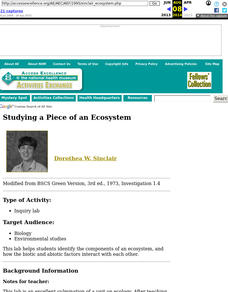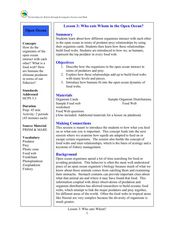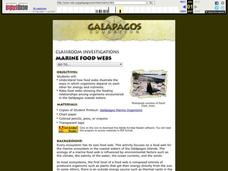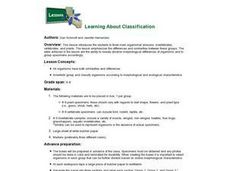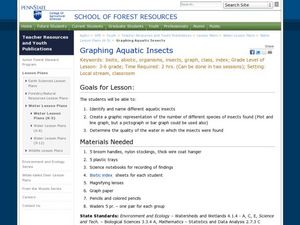Curated OER
Backyard Wildlife Conservation
Students survey local wildlife. They distinguish between permanent and migrating or seasonal species. Students identify species and describe the ecological niche. Students research the food chain and food web for the backyard...
Curated OER
Mouthpart Madness
Young scholars explore the basic biology of a pest. They identify the four major kinds of insect mouthparts and explain how they work. Students examine the specific mouthparts and how they can limit food resources and in what environment...
Curated OER
Threatened, Endangered & Extinct Lesson Plan
Students examine the basic needs of living organisms. In this science instructional activity, students study ecosystems and discover that organisms have basic needs that must be met.
Curated OER
Studying a Piece of an Ecosystem
Students carry out an outdoor land study in which they identify organisms living in the soil, and any other animals living within the site. Groups also examine abiotic factors. They respond to a series of questions concerning their data...
Curated OER
Who Eats Whom in the Open Ocean?
Learners examine how organisms interact with one another in the ocean. In this science lesson plan, students discuss predators and prey in the ocean. Learners discuss food webs and how organisms interact with each other.
Curated OER
Marine Food Webs
Learners examine how food webs illustrate the ways in which organisms depend on each other for energy and nutrients, and make food webs showing the feeding relationships among organisms encountered in the Gal??pagos coastal waters.
Curated OER
An Introduction to the Ocean World
Students comprehend how the organisms that exist within the ocean biome, and categorizing each into producer, consumer, or decomposer. They place various human actions under the headings of "hazard" or "help," illustrating how humans can...
Curated OER
Learning About Classification
Students explore the three main organismal divisions. Students classify organisms by invertebrates, vertebrates, and plants. They observe the differences and similarities between these groups.
Curated OER
Species Diversity and Phylogeny
Young scholars explore the classification system of organisms: taxonomy. They examine prepared slides of Protozoans and record information on a Taxonomy Recording Sheet. Two additional classifying activities are also included in this...
Curated OER
Food Chains
Young scholars investigate the food chain. In this ecology lesson, students define producers and consumers. Young scholars use organism cards to demonstrate how the food chain works.
Curated OER
Choose Your Defense: Spines, Vomit and Camouflage
Students investigate defensive mechanisms of insects and organisms. In this biology activity, students draw imaginary caterpillars as well as imaginary parasites that will harm the caterpillar. Students utilize the Internet...
Curated OER
What Role Do Forest Play in Continuing or Renewing Our Planet's Resources?
Learners explore the interaction between the forest and wildlife. In this forestry lesson, students collect data about forest ecosystems, species of trees, photosynthesis, and interaction of organisms. They prepare a lab activity to...
Curated OER
Clean Water vs. Dirty Water
Students study the importance of clean water to the survival of organisms and what activiities and material pollute water. They measure the temperature of water samples and create a class graph.
Curated OER
Investigative Case - Living in an Alkaline Environment
Students are shown many ways in which Mono Lake water and distilled water are different. They demonstrate that the survival of common soil bacteria declines as pH increases. Students examine the behaviors, adaptations, energy transfer,...
Curated OER
Identifying Quincy's Birds
Students compare a variety or bird characteristics. They identify and classify birds within their local area. Students investigate how to examine and scrutinize differences in features of organisms and understand variation in the...
Curated OER
Photosynthesis
Fourth graders discuss and identify the components of photosynthesis and the products of this process. They participate in a class discussion about the importance of oxygen, and in small groups act out the process of photosynthesis. ...
Curated OER
Life on the Edge: Exploring Deep Ocean Habitats Cool Corals
Students research the basic morphology of Lophelia corals and polyps to determine the significance of these organisms. They detail the reasons that biological communities are focusing on the Lophelia corals as major conservation efforts.
Curated OER
Graphing Aquatic Insects
Students identify aquatic insects. For this organism lesson, students locate aquatic insects near a local waterway and collect them. Students graph the amount of insects that they collected.
Curated OER
Termitology
Learners engage in an inquiry-based study of the ecology of termites. Through hands-on investigations, they explore the life cycle of termites, the termite's role in the food web, and the unique social structure of termite colonies.
Curated OER
Watersheds and Wetlands Lesson Plan
Students study the characteristics of wetlands and watersheds. In this wetlands and watersheds lesson, students study the characteristics of wetlands. They investigate the plants and animals that live there and will tell the reasons...
Curated OER
Mighty Macroinvertebrates
Seventh graders identify the names and features of macroinvertebrates found in Turtle River. In this ecology instructional activity students use digital microscopes and take pictures of invertebrates.
Curated OER
Hawaiian Hot Spots
Students describe how plate tectonics contribute to the development of volcanoes. In this earth science lesson, students examine the map of Hawaii and explore the physical and biological environment there. They write a story about an...
Curated OER
Hands on Biome--Building
Learners create a model biome. For this ecology lesson, students use materials to create a model biome. There is an extension activity that allows learners to write about plants and animals and their specific biome.
Curated OER
Transpiration
Students interactively explore the term transpiration. In this science/ecology lesson, students discuss what they would do if they were thirsty while conducting research in Brazil. Additionally, students write descriptive words to...



